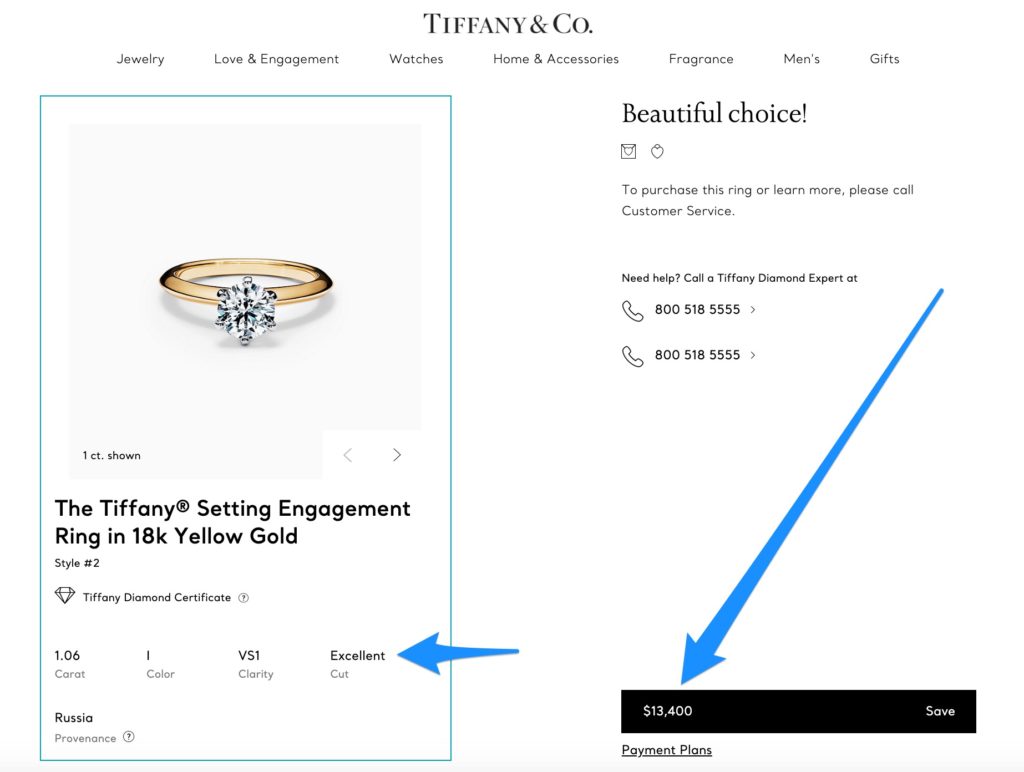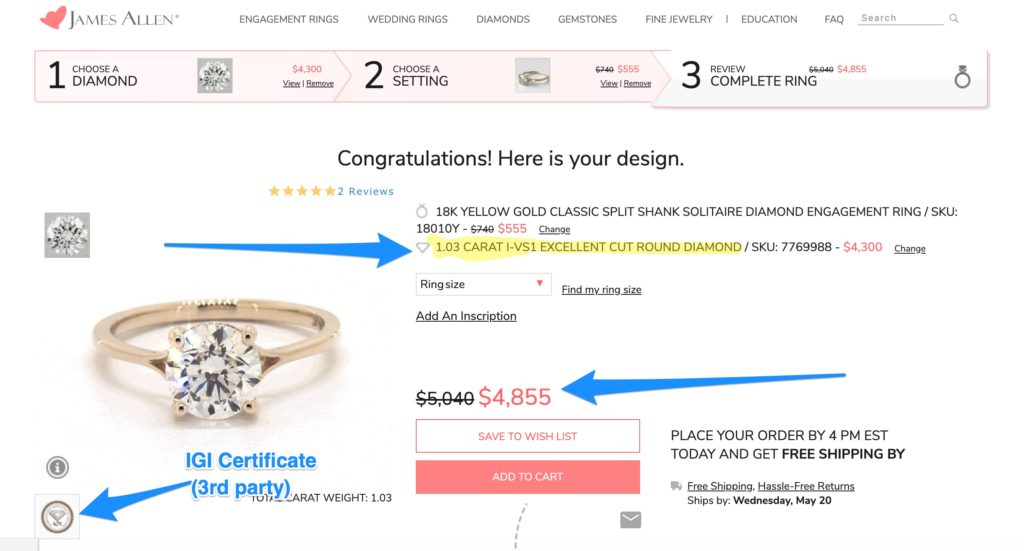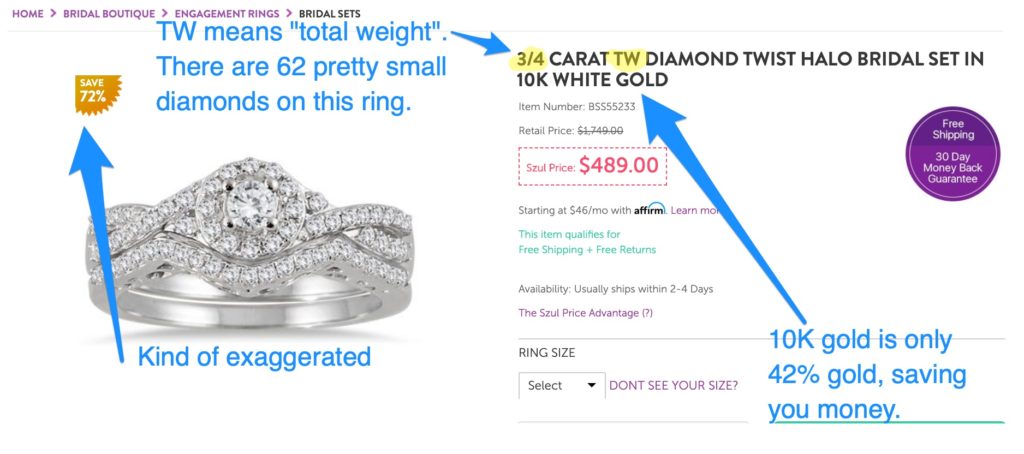Go to the Index of all the lessons in How to Buy an Engagement Ring.
Lesson Objective: You’ll learn about the different kinds of diamond engagement ring retailers on the Internet, and narrow your search for a diamond engagement ring to 2 or 3 specific retailers.

Now that you have …
- learned the all-important Rule #1 when shopping for a diamond
- learned how to read a GIA diamond grading report / certificate
- learned how to budget for a diamond engagement ring
- learned what your three to four preferred cuts / shapes of diamond are …
… it’s time to narrow down to two or three of your favorite diamond retailers.
And by the way, if you need to review any of those quick lessons (you recognized them as the previous lessons, right? 😉 ) you can go back quickly to the Index of all the lessons in How to Buy an Engagement Ring. (That opens in a new tab, if you need a quick review. I’ll be waiting right here.)
Quick Links to Contents on This Page
Why to narrow your search to 2 or 3 retailers first
There’s a tendency when you get ready to buy a diamond on the Internet to shop the way you’d normally shop.
For example, when you’re shopping for a TV, you decide on all the features you want, then find a model that fits all those, and finally shop around to get the lowest price.
When buying a diamond on the Internet, people often follow that same pattern. They start by imagining a diamond they want (of course everyone realizes you can’t choose a model of diamond in the way you can choose a model of TV). They imagine the shape, the color, the clarity, and a good cut.
We may even go so far as to write those things down, or keep them carefully in our minds: “I want a diamond which is around 1-Carat in weight, round brilliant cut, with at least VS1 Clarity and at least H Color.”
Totally understandable.
And it is doable.
But unless you have chosen two or three retailers to focus on, it can lead to a lot of wasted effort and time. It’s what I call the multiple rabbit hole self-torture.
You find yourself highly stressed because you’re searching through the inventory of several different kinds of diamond retailers.
3 kinds of diamond retailers online
There are 3 kinds of retailers of diamond rings. If you don’t decide which kind you’ll shop with, you may cause yourself more stress than necessary.
The reason? Each kind of retailer has …
- Different imaging technologies
- Different ways of shopping through their inventory
- Different value propositions
That last one is so important. Different value propositions!
If you’re shopping all over the place, you end up evaluating your choices based on several different value propositions.
1. The “Tiffany & Co.” kind of diamond jewelry retailer

- EXAMPLES INCLUDE: Tiffany & Co., Cartier, David Yurman, Mikimoto, Bvlgari, Harry Winston, Hermès, Chopard, Chanel, and Van Cleef & Arpels.
- VALUE PROPOSITION: It’s an iconic brand. You just feel good knowing you relied on an iconic brand. You feel good knowing that you bought an engagement ring with Tiffany, or Cartier, etc., on the receipt.
- Some offer 3rd-party, authoritative diamond certificates from the GIA, AGS, or IGI.
- Some offer their own “Store Brand” Diamond Certificate. That is, not a certificate from a recognized, authoritative 3rd party such as the GIA, AGS, or IGI. It’s just them certifying their own diamonds. Surprising, from such expensive brands, but it happens. For example, Tiffany & Co. offers a Tiffany & Co. Diamond Certificate, not a GIA diamond certificate.
- PRICES: The prices at these iconic brand stores are quite a bit higher than at some other kinds of stores.
- PEOPLE WHO SHOP THERE: Have plenty of money. Price isn’t a big deal to them.
2. The “James Allen” kind of diamond jewelry retailer

- EXAMPLES INCLUDE: James Allen, Blue Nile, Brian Gavin, Brilliance.com, and Whiteflash.
- VALUE PROPOSITION: It’s a trusted brand with an innovative website, solid guarantees, and lower prices on GIA-, IGI-, or AGS-certified diamonds. You feel good knowing you got the best price.
- Most offer 3rd-party, authoritative diamond certificates from the GIA, AGS, or IGI. Always check for a certificate for any diamond that you buy.
- PRICES: The prices at these stores are competitive, but not bargain basement.
- PEOPLE WHO SHOP THERE: Have access to enough money to afford a $2,000 to $7,000 diamond engagement ring. Some people spend more, some less. Price is important to them. So is the ability to shop online with the latest imaging technology.
3. The “Szul” kind of diamond jewelry retailer

- Examples include: Szul, SuperJeweler.
- VALUE PROPOSITION: It’s a trusted brand, but with the lowest possible volume discounts. Some diamonds might be GIA-, IGI-, or AGS-certified diamonds, but most are not. Most diamond engagement rings feature a 1/10th or 1/5th Carat center stone in a cluster. These are lower-budget diamond rings, and there’s nothing wrong with that.
- They seem to mark up the diamonds and then mark them down with “huge savings” coupons and so on. (In my view, and most industry experts agree: diamonds never really go on sale. The settings go on sale, but diamond engagement rings marked “70% off” are questionable.)
- PRICES: The prices at these stores are the lowest possible for diamond engagement rings and other jewelry.
- PEOPLE WHO SHOP THERE: Want the lowest possible price. Or need to find the lowest possible price. This means they’re willing to acquire less than high grade diamonds. There’s nothing wrong with that, since everyone has a level at which they can purchase. And there’s often no great loss in a 1/5th carat diamond of low color quality and low clarity. It still gives a little sparkle. But the diamond itself is too small to see very well. The ability to shop online is important to these shoppers. But they don’t need the latest in 3D or video shopping technology. They just want to make a decent purchase, need to avoid spending a lot, and need to get the best deal they can and do it without a lot of fuss.
Avoid confusing your shopping values
Unless you had chosen to shop among retailers such as Tiffany, or retailers such as James Allen, or retailers such as Szul, you’d confuse yourself repeatedly.
One moment you might look at a Tiffany ring and think, “Maybe this one’s better. It’s an iconic brand! I can’t go wrong with Tiffany!”
Then you might look at a ring at James Allen and think, “Well maybe this one’s better — I can look at it endlessly in 3D imaging. And there’s a GIA certificate, not just a store’s own certificate.”
Or you might click over to Szul, and see a 70% off sale, and think, “I better jump on that!”
Each one of these stores has a different value proposition. To make your journey more enjoyable, you should first decide which value proposition appeals most to you.
Honestly look at the three value propositions in the three sections just above, and make a choice.
That’s really what we’re talking about when I say it’s best to choose a kind of retailer.
That’s why it’s best to choose a kind of retailer that you’ll plan to shop with.
You go into it knowing what you value. So when you finish your purchase, you’ll feel very good about it.
Some iconic, generations old brands, all A+ at the BBB
If you value buying from an iconic brand, and the prices are not a problem for you, then you could choose that kind of store now.
Some newer, online brands, all A+ at the BBB
If you value buying from a newer company which offers 3rd-party certified diamonds, of the same quality, at much lower prices, then choose that now.
Some trusted brands of low-cost diamond jewelry, each at A or A+ at the BBB
If price is of paramount importance to you right now, you really want a diamond, and not a ruby or sapphire, and you can’t responsibly afford an engagement ring costing into several thousands of dollars, then these are perfectly respectable choices. They’re trustworthy and declare what they’re selling. Just never buy from them unless it’s on sale and/or you have a big coupon to apply. The reason is that the “list” prices are rather pricey for what this jewelry is. It’s perfectly good jewelry. But the list prices are kind of jacked up.
Which kind of retailer do you choose?
Which kind of retailer do you choose for buying a diamond engagement ring? You’ll be able to tell that my values are for the second kind. The newer, online brands disrupting the industry in favor of (in my view) you, the consumer.
If you go with the iconic brands (all A+ at the BBB), you can still learn a lot here at How to Shop for a Diamond. You’ll go into your journey with better information, and you’ll get the diamond you want.
If you go with the James Allen kind of brands (all A+ at the BBB), you’ll really get a lot out of the rest of this course. You’ll get a diamond you love at a price you really can afford.
I’ll mention the Szul discount type of brand stores from time to time in this online resource, including the whole website. The main thing to know about them is: never pay list price at a Szul type of store.
No matter which kind of retailer you decide to focus on, you’ll get a lot out of my posts here. This course covers the basics. I fill in a lot of gaps, and answer a lot of questions, in the posts.
But to declare myself: the James Allen way of shopping for diamonds online is the most exciting, innovative, fascinating way to shop for diamonds, and I’ll focus mainly on that kind of site — without totally neglecting the Tiffany & Co. kind, or the Szul kind.